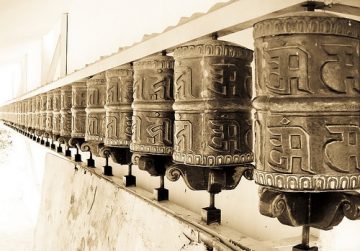
by Zenaida
Truth sublime, truth eternal…
If all truth fits into one great whole, then where do we draw the line? I have learned some great truths from sources outside the church. In former years, I would simply have either seamlessly integrated them into my Mormon worldview, or dismissed them as being incomplete. During a period of questioning, I allowed myself some freedom to explore other methods of spiritual practice, and I moved into wondering if finding truth from other sources meant I should follow them to the source. Right now, I’m more inclined to believe that everyone has truth, and everyone has something to teach. Being open to learning from friends and strangers of other faiths, or none at all, has taught me some of life’s great lessons in ways that I hadn’t seen before, like the divinity within all human beings.
I want to share something I’ve learned from Tibetan Bhuddism. Prayer wheels are engraved with a prayer and then spun so the faithful can keep this mantra in their minds. It is the same as speaking the mantra aloud. I like this tactile, visual, interactive model for being reminded of important truth. Contemplating the mantra while spinning the wheel is very helpful in meditation.
Om Mani Padme Hum
“In dependence on one’s own practice of patience, generosity, compassion, love, and wisdom, one can transform the imperfect being to a pure exalted body, speech and mind.”
In his book, Ethics for the New Millennium, the Dalai Lama expounds on the principle of compassion. He rhetorically asks if developing compassionate love to the point of the unconditional requires the total abandonment of self-interest. He suggests that on the contrary, serving others interests is the best way to serve our own. One might say, “He who seeks his life shall lose it, and he who loses his life shall find it.”
It is reinvigorating to have truths presented to me from new directions. It helps me feel more connected to my fellow humans.
Have you found truth in exploring other spiritual practices?





